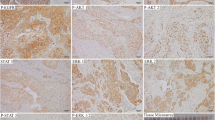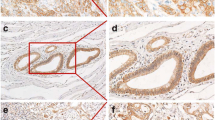Abstract
Background
Long-term survival of surgically resectable pancreatic cancer patients is uncommon. The epidermal growth factor receptor (EGFR) and the phosphoinositol-3-kinase pathways are often activated in pancreatic cancer, and an understanding of their role in resected cases may help refine adjuvant therapy.
Methods
We investigated the expression of EGFR, Erk, Akt, and their phosphoforms (p-) in pancreatectomy specimens and correlated these with survival. Thirty-nine consecutive surgically resected pancreatic adenocarcinoma cases were included. Immunohistochemical staining of paraffin-embedded blocks was performed by using monoclonal antibodies against EGFR, Erk, p-Erk, Akt, and p-Akt. A standard immunoperoxidase technique was used to detect the avidin-biotin peroxidase complex. Immunostaining was visually scored with the histoscore method by two surgical pathologists.
Results
Patient characteristics were as follows: 17 men and 22 women; median age, 66 years; and American Joint Committee on Cancer stage I, 5 patients; stage II, 4 patients; stage III, 27 patients; and stage IV, 3 patients. The tumor was World Health Organization grade 1 in 4, grade 2 in 17, and grade 3 in 18 cases. Adjuvant therapies were chemotherapy (n = 6), radiotherapy (n = 1), and chemoradiotherapy (n = 17). Immunohistochemistry revealed positive expression of EGFR in 30.8%, Erk in 92.3%, p-Erk in 45.9%, Akt in 71.8%, and p-Akt in 20.5% of cases. On univariate analyses, tumor grade (P = .0098), p-Akt (P = .0003), and p-Erk (P = .0052) expression correlated with survival. On multivariate analyses, age (P = .0002; hazard ratio [HR], 1.8), grade (P = .00318; HR, 3.0), Akt (P = .0433; HR, .4), p-Akt (P = .0002; HR, .2), and p-Erk (P = .0003; HR, 3.5) expression correlated significantly with survival.
Conclusions
p-Erk and p-Akt expression may have prognostic and therapeutic implications in pancreatic cancer.



Similar content being viewed by others
References
Sener SF, Fremgen A, Menck HR, Winchester DP. Pancreatic cancer: a report of treatment, survival trends for 100,313 patients diagnosed from 1985-1995, using the National Cancer Database. J Am Coll Surg 1999; 189:1–7
Jemal A, Murray T, Ward E, et al. Cancer statistics, 2005. CA Cancer J Clin 2005; 55:10–30
Chu QD, Khushalani N, Javle MM, Douglass HO Jr, Gibbs JF. Should adjuvant therapy remain the standard of care for patients with resected adenocarcinoma of the pancreas? Ann Surg Oncol 2003; 10:539–45
Bleday R, Tzanakakis GN, Schwalke MA, Wanebo HJ, Vezeridis MP. Epidermal growth factor stimulation and metastatic rate in human pancreatic carcinoma cell lines. J Surg Res 1990; 49:276–9
Clarke LE, Leitzel K, Smith J, Ali SM, Lipton A. Epidermal growth factor receptor mRNA in peripheral blood of patients with pancreatic, lung, and colon carcinomas detected by RT-PCR. Int J Oncol 2003; 22:425–30
Yamanaka Y. The immunohistochemical expressions of epidermal growth factors, epidermal growth factor receptors and c-erbB-2 oncoprotein in human pancreatic cancer. Nippon Ika Daigaku Zasshi 1992; 59:51–61
Tan X, Egami H, Ishikawa S, et al. Relationship between activation of epidermal growth factor receptor and cell dissociation in pancreatic cancer. Int J Oncol 2004; 25:1303–9
Ueda S, Ogata S, Tsuda H, et al. The correlation between cytoplasmic overexpression of epidermal growth factor receptor and tumor aggressiveness: poor prognosis in patients with pancreatic ductal adenocarcinoma. Pancreas 2004; 29:e1–8
Feng J, Adsay NV, Kruger M, et al. Expression of ERRP in normal and neoplastic pancreata and its relationship to clinicopathologic parameters in pancreatic adenocarcinoma. Pancreas 2002; 25:342–9
Burtness B. The role of cetuximab in the treatment of squamous cell cancer of the head and neck. Expert Opin Biol Ther 2005; 5:1085–93
Xiong HQ, Rosenberg A, LoBuglio A, et al. Cetuximab, a monoclonal antibody targeting the epidermal growth factor receptor, in combination with gemcitabine for advanced pancreatic cancer: a multicenter phase II trial. J Clin Oncol 2004; 22:2610–6
Saltz LB, Meropol NJ, Loehrer PJ Sr, Needle MN, Kopit J, Mayer RJ. Phase II trial of cetuximab in patients with refractory colorectal cancer that expresses the epidermal growth factor receptor. J Clin Oncol 2004; 22:1201–8
Cohen MH, Johnson JR, Chen YF, Sridhara R, Pazdur R. FDA drug approval summary: erlotinib (Tarceva) tablets. Oncologist 2005; 10:461–6
Burtness B, Goldwasser MA, Flood W, Mattar B, Forastiere AA. Phase III randomized trial of cisplatin plus placebo compared with cisplatin plus cetuximab in metastatic/recurrent head and neck cancer: an Eastern Cooperative Oncology Group study. J Clin Oncol 2005; 23:8646–54
Malik SN, Siu LL, Rowinsky EK, et al. Pharmacodynamic evaluation of the epidermal growth factor receptor inhibitor OSI-774 in human epidermis of cancer patients. Clin Cancer Res 2003; 9:2478–86
Malik SN, Brattain M, Ghosh PM, et al. Immunohistochemical demonstration of phospho-Akt in high Gleason grade prostate cancer. Clin Cancer Res 2002; 8:1168–71
Malik SN, Bedolla RG, Hidalgo M, Brattain MG, Kreisberg JI. Immunohistochemical determination of EGFR-tyrosine kinase inhibition in clinical samples. Methods Mol Med 2003; 85:135–40
Jiang D, Liang J, Humphrey LE, Yang H, Brattain MG. Expression of TGFalpha autocrine activity in human colon carcinoma CBS cells is autoregulated and independent of exogenous epidermal growth factor. J Cell Physiol 1998; 175:174–83
Luttges J, Schemm S, Vogel I, Hedderich J, Kremer B, Kloppel G. The grade of pancreatic ductal carcinoma is an independent prognostic factor and is superior to the immunohistochemical assessment of proliferation. J Pathol 2000; 191:154–61
Beger HG, Rau B, Gansauge F, Poch B, Link KH. Treatment of pancreatic cancer: challenge of the facts. World J Surg 2003; 27:1075–84
Shah A, Swain WA, Richardson D, et al. Phospho-akt expression is associated with a favorable outcome in non-small cell lung cancer. Clin Cancer Res 2005; 11:2930–6
Testa JR, Tsichlis PN. AKT signaling in normal and malignant cells. Oncogene 2005; 24:7391–3
Testa JR, Bellacosa A. AKT plays a central role in tumorigenesis. Proc Natl Acad Sci U S A 2001; 98:10983–5
Boucher MJ, Morisset J, Vachon PH, Reed JC, Laine J, Rivard N. MEK/ERK signaling pathway regulates the expression of Bcl-2, Bcl-X(L), and Mcl-1 and promotes survival of human pancreatic cancer cells. J Cell Biochem 2000; 79:355–69
Ding XZ, Adrian TE. MEK/ERK-mediated proliferation is negatively regulated by P38 map kinase in the human pancreatic cancer cell line, PANC-1. Biochem Biophys Res Commun 2001; 282:447–53
Motomura W, Tanno S, Takahashi N, et al. Involvement of MEK-ERK signaling pathway in the inhibition of cell growth by troglitazone in human pancreatic cancer cells. Biochem Biophys Res Commun 2005; 332:89–94
Gysin S, Lee SH, Dean NM, McMahon M. Pharmacologic inhibition of RAF→MEK→ERK signaling elicits pancreatic cancer cell cycle arrest through induced expression of p27Kip1. Cancer Res 2005; 65:4870–80
Yamamoto S, Tomita Y, Hoshida Y, et al. Prognostic significance of activated Akt expression in pancreatic ductal adenocarcinoma. Clin Cancer Res 2004; 10:2846–50
Regine WF, Abrams RA. Adjuvant therapy for pancreatic cancer: back to the future. Int J Radiat Oncol Biol Phys 1998; 42:59–63
Okami K, Wu L, Riggins G, et al. Analysis of PTEN/MMAC1 alterations in aerodigestive tract tumors. Cancer Res 1998; 58:509–11
Stanger BZ, Dor Y. Dissecting the cellular origins of pancreatic cancer. Cell Cycle 2006; 5:43–6
Altomare DA, Tanno S, De Rienzo A, et al. Frequent activation of AKT2 kinase in human pancreatic carcinomas. J Cell Biochem 2003; 88:470–6
Acknowledgments
The authors thank Donna Oleszek for performing immunohistochemical staining for EGFR signaling intermediates. Supported by National Institutes of Health grants CA62502 and CA16056.
Author information
Authors and Affiliations
Corresponding author
Rights and permissions
About this article
Cite this article
Chadha, K.S., Khoury, T., Yu, J. et al. Activated Akt and Erk Expression and Survival After Surgery in Pancreatic Carcinoma. Ann Surg Oncol 13, 933–939 (2006). https://doi.org/10.1245/ASO.2006.07.011
Received:
Accepted:
Published:
Issue Date:
DOI: https://doi.org/10.1245/ASO.2006.07.011




